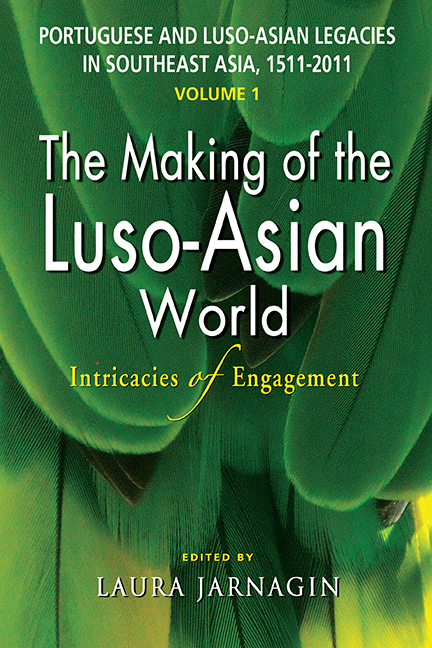 Portuguese and Luso-Asian Legacies in Southeast Asia, 1511–2011, vol. 1
Portuguese and Luso-Asian Legacies in Southeast Asia, 1511–2011, vol. 1 Book contents
- Frontmatter
- Contents
- List of Charts, Figures and Tables
- A Tribute to Glenn Ames
- Preface
- List of Contributors
- Glossary
- Introduction: Towards Clarity through Complexity
- Part One Adaptations and Transitions in the South and Southeast Asian Theatres, Sixteenth through Eighteenth Centuries
- Part Two Dispersion, Mobility and Demography from the Sixteenth into the Twenty-first Centuries
- Part Three Mixed Legacies: The Portuguese and Luso-Asians in the Twentieth and Twenty-first Centuries
- 9 Portuguese Communities in East and Southeast Asia during the Japanese Occupation
- 10 Indo-Portuguese Literature and the Goa of Its Writers
- 11 Binding Ties of Miscegenation and Identity: The Narratives of Henrique Senna Fernandes (Macao) and Rex Shelley (Singapore)
- 12 Portuguese Past, Still Imperfect: Revisiting Asia in Luso-Diasporic Writing
- Bibliography
- Index
10 - Indo-Portuguese Literature and the Goa of Its Writers
from Part Three - Mixed Legacies: The Portuguese and Luso-Asians in the Twentieth and Twenty-first Centuries
Published online by Cambridge University Press: 21 October 2015
- Frontmatter
- Contents
- List of Charts, Figures and Tables
- A Tribute to Glenn Ames
- Preface
- List of Contributors
- Glossary
- Introduction: Towards Clarity through Complexity
- Part One Adaptations and Transitions in the South and Southeast Asian Theatres, Sixteenth through Eighteenth Centuries
- Part Two Dispersion, Mobility and Demography from the Sixteenth into the Twenty-first Centuries
- Part Three Mixed Legacies: The Portuguese and Luso-Asians in the Twentieth and Twenty-first Centuries
- 9 Portuguese Communities in East and Southeast Asia during the Japanese Occupation
- 10 Indo-Portuguese Literature and the Goa of Its Writers
- 11 Binding Ties of Miscegenation and Identity: The Narratives of Henrique Senna Fernandes (Macao) and Rex Shelley (Singapore)
- 12 Portuguese Past, Still Imperfect: Revisiting Asia in Luso-Diasporic Writing
- Bibliography
- Index
Summary
There is no better introduction to the Goa of its Indo-Portuguese writers than an excerpt from the novel O Último Olhar de Manú Miranda (The Last Look of Manú Miranda) by Orlando da Costa (1929–2006), published by Âncora in 2000. It can be said that this work is a Bildungsroman, the coming-of-age novel of the Brahmin Catholic Manuel João da Piedade Miranda, entering the world some decades before the end of the Portuguese colonial period with two possible paths open to him: either the route of the Metropolis like those disillusioned with their native land, or becoming a batcar (landowner) like his ancestors. This novel, in the words of Orlando da Costa himself, accompanies the life experiences of the Goa of its author, who was born in Mozambique and died in Portugal, but whose childhood and adolescence were profoundly Goan. In the book, Manú's mother gives birth to him in the same moment as another was born who was to become his best friend in childhood, a Hindu boy named Xricanta. These two little creatures were “destined to be twins”, even to the point that their physical transformations into adolescence happened for both of them “on the same day and at the same time”. Only one thing separated them irrevocably: religion, with its baggage of precepts and customs.
This study is a reflection on the complexities of the Indo-Portuguese culture of Goa as revealed in its literature from the late nineteenth century — when nativist voices began to emerge in the fiction and the poetry — to the present early twenty-first century — a half-century into the postcolonial era. The authors treated herein — including Orlando da Costa, Vimala Devi (Teresa da Piedade de Baptista Almeida), Francisco Luís Gomes, Leopoldo da Rocha and Gip (Francisco João da Costa) — are Goan natives raised in a Catholic and Portuguese-like environment amid the forces of the Indian caste system and the Hindu ancestral universe. Behind the supposed “communion of monasteries and pagodas”, religious and socio-economic differences feed an identifiable but thus far irreconcilable “confusion” of personal identity and being. This essay explores the nature and challenges of this irreconcilability, both for the culture itself and for its literary chroniclers.
- Type
- Chapter
- Information
- Portuguese and Luso-Asian Legacies in Southeast Asia, 1511–2011, vol. 1The Making of the Luso-Asian World: Intricacies of Engagement, pp. 229 - 238Publisher: ISEAS–Yusof Ishak InstitutePrint publication year: 2011


